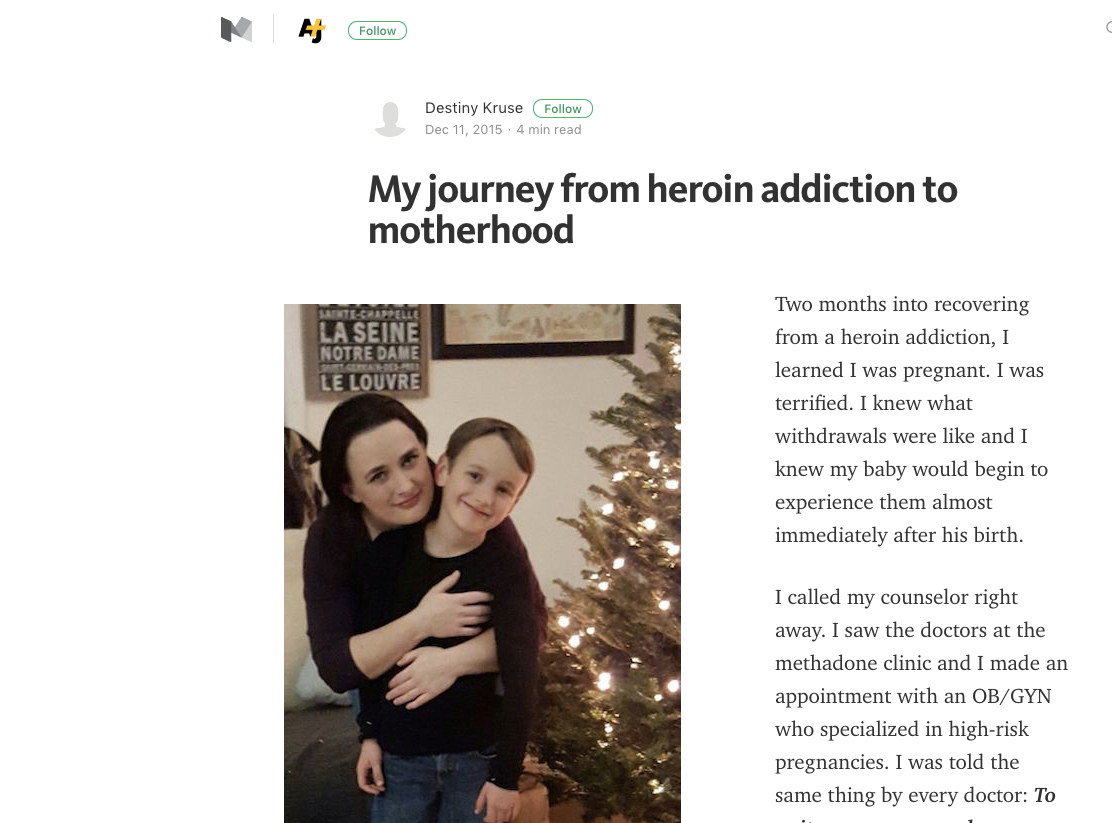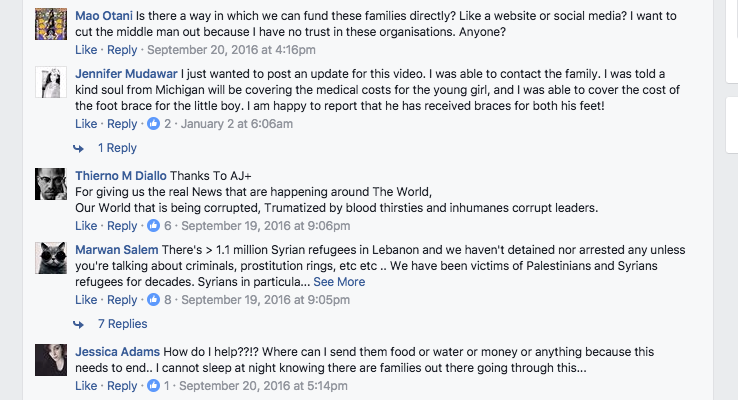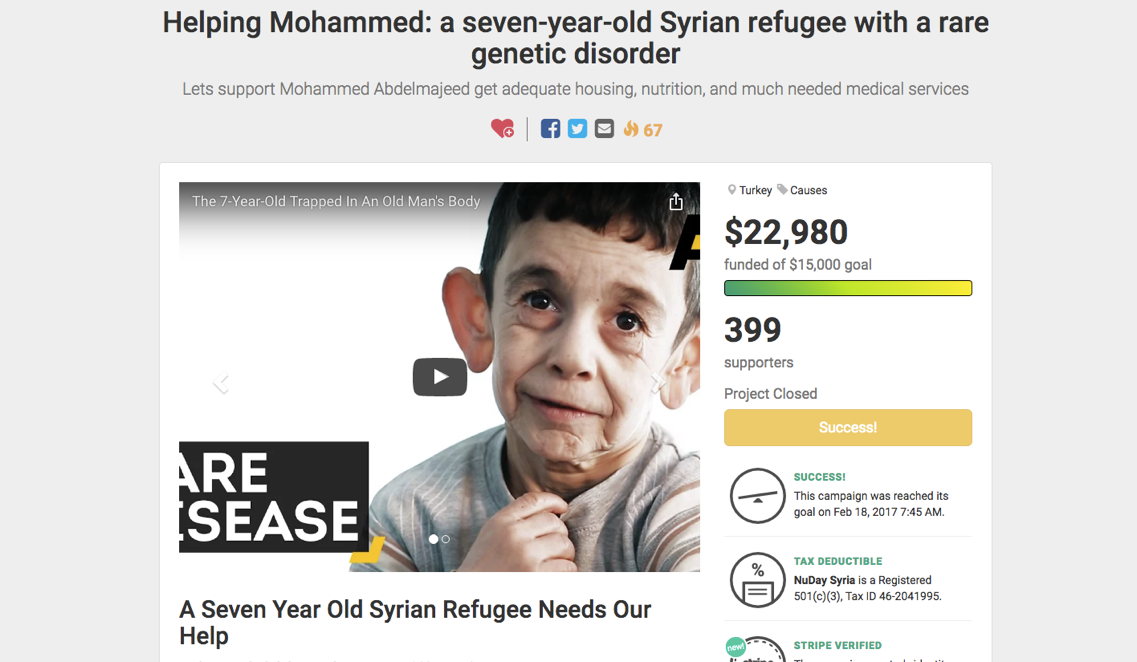أصبحت ويلات الحرب اليوم في متناول الجماهير أكثر من أي يوم مضى. فقد أصبحوا يصلون إلى مقاطع الفيديو الأصلية من الناشطين ومقاطع الفيديو غير الخاضعة للرقابة بالسرعة ذاتها التي يصل إليها الصحافيون أو حتى قبلهم في بعض الأحيان. كذلك سمح انفتاح المراسلين على الجمهور، حتى العاملين في الصحافة التقليدية المطبوعة والمرئية والمسموعة، والذي انعكس في التفاعل بينهم وبين متابعيهم على تويتر، سمح للمشاهدين بأن يدخلوا إلى كواليس الأحداث. وأصبح الناس اليوم جزءاً من دورة الأخبار بدلاً من أن يكتفوا بمشاهدة تقارير معدّة سابقاً في نشرة الأخبار المسائية.
تسمح مشاهدة "الجزيرة بلس" AJ+ برؤية شيء مختلف جداً في طريقة تغطيتنا للنزاع. فنحن لا نصل عبرها فقط إلى جماهير جديدة على منصات جديدة، بل نغيّر أيضاً طريقتنا في إخبار القصص الصحافية. ويسمح لنا جمهور الأخبار على الشبكات الاجتماعية والجمهور الذي يتمتّع بثقافة إعلامية أكبر، لا بل يجبرنا على تجديد الطريقة التي نغطّي فيها الحرب والنزاع. ويطالبنا الجمهور بألاّ نحذف شيئاً من تغطياتنا الإخبارية. فقصصنا تظهر أولاً على صفحات التغذية الإخبارية لدى المستخدمين (News feed) ما يعني أنها هي التي تأتي إليهم وليس العكس. فجمهورنا لا يختار الجلوس ومشاهدة الأخبار المسائية، بل يصادفونها أثناء تصفّحهم الأخبار على فيسبوك أو على تويتر. ولذلك انعكاسات على كيفية قيامنا بعملنا.
ماذا يعني ذلك؟ يعني أن علينا أن نحرص على عدم النشر المفاجئ للمقاطع الصادمة في بداية أي فيديو. فمن الأفضل أن نحضّر الجمهور لما سيشاهدونه سواء عبر مقدّمة توضيحية أو عن طريق أسلوب إخبارنا القصة الصحافية. وهذا الجمهور لا يقدّر الفيديو المجاني الذي لا يعالج قضية اجتماعية أكبر. ولكن حين نعرض مقطع فيديو يتضمّن مشاهد صادمة يجب أن يكون لدينا سبب وجيه لذلك. كما أننا أحياناً قد نقع في الخطأ ويسارع جمهورنا إلى لفت نظرنا.
حلقة ردود الفعل
لدى الإعلام الاجتماعي بُعد فريد خاص به بسبب حلقة ردود الفعل التي تنشأ فيه وانخراط الجمهور. ففي "الجزيرة بلس"، تعتبر لحظة نشر الفيديو بمثابة بداية حلقتنا الإخبارية على عكس العديد من الصحافيين التلفزيونيين الذين ينتهي عملهم بمجرّد أن يبث تقريرهم على الهواء. فبين المراسلين التلفزيونيين والجمهور لا يوجد تفاعل فوري ومباشر، على الأقل ليس بالطريقة ذاتها كما في الإعلام الاجتماعي.
غالباً ما يعرف جمهورنا عن القصة الصحافية التي نعمل عليها أكثر منّا. فبمجرّد أن ننشر فيديو ما، يبدأ الجمهور بالتأكد من الحقائق التي يتضمّنها، وفي حال وجدوا أي أخطاء يعلّقون في غضون دقائق. وهذه من اللحظات الأكثر رعباً للمنتجين، إذ إنها تزيد علينا عبء التحقق أكثر من الإعلام المرئي التقليدي. فخانة التعليقات تقع مباشرة تحت عملنا وتسمح للمشاهدين بمناقشة الحقائق الواردة في الفيديو وانتقادها والتأكّد منها من مصادر جماعية. وعلى عكس الأخبار التلفزيونية، لا تسير تغطيتنا باتجاه واحد، فمقاطع الفيديو التي ننتجها ليست سوى بداية المحادثة.
كذلك قد تكون خانة التعليقات طريقة مفيدة لإيجاد مصادر لقصص صحافية أو لتطوير قصص أخرى. فعلى سبيل المثال، عرضنا قصة عن أطفال ولدوا مدمنين على الهيرويين (لأن الأم مدمنة) وعن المسائل الأخلاقية التي تثيرها هذه الحالة. فسارع بعض الضحايا إلى الانضمام إلى النقاش الذي دار في خانة التعليقات، حيث تفاعلوا مع جمهورنا وأجابوا عن أسئلتهم وعن أسئلة كل شخص شاهد الفيديو مجدداً. وكلّفنا إحدى المعلّقات بالكتابة عن تجاربها.

وحين نشرنا تقريراً عن عائلة سورية لاجئة تعيش بشكل غير قانوني في لبنان مع ولدين من ذوي الاحتياجات الخاصة يحتاجان إلى العلاج، وردتنا مئات عروض المساعدة. وكان الناس يعلّقون تحت الفيديو عارضين تقديم مساعدات مالية ومعدّات طبّية وحتى كفالة لتأشيرة الدخول. وتواصل هؤلاء المتبرعون مع منظمات غير حكومية في خانة التعليقات ونجحوا في مساعدة العائلة.

غطّينا قصّة طفل سوري لاجئ يعاني من مرض الشيخوخة (بروجيريا)، حيث كان يبدو كهلاً في جسم طفل. خلال شهرين شاهد فيديو الطفل 21 مليون شخص. من بين هؤلاء كان الرجل الذي سيصبح أول رائد فضاء مسلم والذي سافر إلى تركيا ليلتقي محمد البالغ من العمر 7 سنوات وسجّلنا اللقاء العاطفي حيث سلّمه الهدايا ورسم بسمة على وجهه. كذلك، تأثرت مجموعة نساء من الولايات المتحدة بالفيديو وقررن مساعدة محمد. ونما فريق جمع التبرّعات من 10 أشخاص إلى أكثر من 100 داعم. وبدأوا حملة لمساعدة عائلة محمد لبدء عملية تقديم طلب لجوء لكي يعيش في بلد يؤمّن له الرعاية الصحية والتعليم الذي يحتاجه.

السلامة والأخلاقيات
يمكننا تقليص تكاليف تغطية الحروب والنزاعات من خلال إحالة جميع المخاطرات والمسؤوليات إلى موظفين مستقلّين لأن ذلك أقل كلفة من إرسال فريقك الخاص إلى الميدان. غير أن هذا النوع من القرارات دونه مسؤوليات كبيرة. لذلك فإن حماية فريقنا والعاملين بشكل مستقل معنا يجب أن يكون على رأس أولويّاتنا كمؤسسات إعلامية مرئية ومسموعة ومكتوبة. وللأسف كان مقتل مصوّر مستقل كان يلتقط صوراً لـ "رويترز" في حلب في العام 2013، درساً لنا جميعاً. فقد ذكّرنا بأنه ليس علينا أن نسعى وراء قصة صحافية مهما كان الثمن.
في "الجزيرة بلس"، تأتي معظم موادنا الأصلية من صحافيين مستقلّين. يثير ذلك بعض المسائل: حين يعرض الصحافيون المستقلّون أفكارهم علينا، وهم لم يخضعوا سابقاً ربما للتدريب على العمل في منطقة نزاعات أو لا يشملهم التأمين الذي نقدّمه لصحافيينا.
ولكنّ ثمة مسألة أكبر هنا، فالجزيرة هي واحدة من أكبر شبكات البث في العالم، وحتى لو تمكنّا من حماية أنفسنا والعاملين المستقلّين معنا، قد نخلق سوقاً خطرة. لذلك نتعامل بدقّة وحذر مع عملية تكليف صحافيين مستقلّين بحيث نأخذ في الاعتبار البلد الذي يأتون منه والمنطقة التي نفكّر في إرسالهم إليها. وبتنا لا نعيّن صحافيين مستقلّين في بعض المناطق. ويعود ذلك إلى أنه إذا أصبح معروفاً أننا نأخذ مواد من صحافيين مستقلّين في سوريا مثلاً، فقد يتشجّع صحافيون عديمو الخبرة ليجرّبوا حظّهم أيضاً في الدخول إلى هذا البلد ومن ثم عرض أفكارهم علينا. لنأخذ مثلاً حالة سونيل باتيل الشاب البالغ من العمر 25 عاماً والذي دخل إلى سوريا ليتعلّم كيف يصبح صحافياً والذي نجا بأعجوبة فقط من الموت المحتّم. وقصّة باتيل هي مثال على كيفية تحوّل بعض المناطق إلى مغناطيس للصحافيين الشباب. ولكنّها أيضاً تذكير بكيف يمكن أن تتضاعف مخاطر تغطية الحروب بسبب غياب التحضير والدعم من المنظمات الإعلامية والتأمين والتدريب.
ولكن رغم أننا غير قادرين على دخول بعض المناطق مثل سوريا، ورغم أنّي لا أعتقد أن علينا تكليف صحافيين من بعض الأماكن، إلاّ أنه يبقى بإمكاننا تغطية هذه القصص بفعالية. لا يجب أبداً أن نعتمد فقط على شبكة الناشطين. وعلينا أن نطوّر دائماً معايير تحقق خاصة بنا والتأكد من المصادر من أجل ضمان صحة المحتوى الذي ينتجه هؤلاء، أو يمكننا أن نستخدم مشاهد أنتجها مستخدمون وجرى التحقق منها من وكالات الأنباء. فمسؤوليتنا تقوم على التعامل مع الناشطين كموظفين مستقلّين. لذلك لا يمكننا أن نطلب منهم التقاط مشاهد لنا لمجرّد وجودهم في المكان والزمان المناسبين. ما يمكننا فعله هو دمج مشاهد من ناشطين مع مقابلات عبر سكايب نجريها من غرفة الأخبار. فنحن نجري مقابلات عبر سكايب مع أشخاص على الأرض ومن ثم نحررها بالطريقة ذاتها التي يتعامل معها الإعلام التقليدي مع مقابلات يجريها في الميدان.
هل يختصر ذلك الوقت والمال؟ لا أعتقد ذلك لأن مقاطع فيديو الناشطين يجب أن تخضع لعملية تحقق وتدقيق تماماً كمواد الصحافيين المستقلّين. ولكن الفرق أن ما نصوّره عادة بكاميرا احترافية في الميدان يمكن تصويره عبر سكايب (مشاهدونا يجيزون ذلك). وبالطبع فهناك دائماً رسالة شخصية يرغب الناشطون في إبرازها ولكننا دائماً نتحقق من مقاطع الفيديو المرسلة.
علينا أن نحافظ على سلامة زملائنا سواء كانوا موظفين دائمين أو مستقلين، من دون أن نفقد القصة. فالطريقة التي تتغيّر فيها الصحافة، بحيث يبني الصحافيون علاقات جديدة مع الجمهور الذي لم يعد مجرّد مشاهد بل أصبح مساهماً أيضاً، تعني أنّه لا يمكن أن نسمح بأن تفوتنا قصّة صحافية.
كيف تقرر التكليفات بشكل آمن؟
حين توزّع التكليفات أو المهام في منطقة نزاع، لا تدع المساهم المستقلّ يتحمّل مخاطر لا تسمح لأحد من موظفيك الدائمين أن يتحمّلها. ثمة بعض الأمور المهمة التي يجب أن تتحقق منها:
-
هل لدى الصحافي المستقل الذي تتعامل معه بوليصة تأمين للعمل في منطقة نزاع؟ إن لم يكن لديه واحدة فهل يغطّيه تأمين مؤسستك؟ هل يجب أن تبلغ شركة التأمين؟ فالتأمين إجباري للصحافيين المستقلّين الذين يعملون من مناطق حرب.
-
هل خضع الصحافي المستقل لتدريب على التغطية في مناطق النزاع؟ إن كان الجواب لا فهل تستطيع أن تضمن حصوله على التدريب قبل أن تعمل معه؟ تعتبر "ذا روري بيك تراست" The Rory Peck Trust مورداً جيداً جداً للصحافيين المستقلين.
-
هل يتيح القانون لهذا الصحافي المستقل العمل في البلد الذي تكلّفه فيه؟ فحتى لو لم يكن الصحافي مستهدفاً من الأطراف المتحاربة، قد يواجه متاعب إن كان دخل البلد بتأشيرة سياحية، وهذا الأمر يمكن أن يشكّل خطراً على صحافيين مستقلين آخرين أو حتى على فريقك العامل في ذلك البلد.
-
هل لديك مكتب في البلد الذي تكلّف فيه الصحافي المستقل أو متخصص في شؤونه في غرفة الأخبار؟ هل ثمة مخاطر خاصة فقط بهذا البلد عليك أنت والصحافي المستقل أن تحذرا منها؟ هل أبلغت مكتبك المحلّي بأنك تكلّف صحافياً مستقلاً في بلده؟ (في حال واجه متاعب فإن أول باب تطرقه السلطات هو باب مكتبك في هذا البلد. أضف إلى ذلك أن الصحافي سيشعر بأمان أكثر إذا كان مدعوماً من مكتبك المحلّي كما أنه سيتصّل بالمسؤولين فيه لطلب المساعدة).
-
هل الصحافي يعمل مع منسق محلّي؟ إن لم تكن الحال كذلك فلمَ لا؟ هل تعرف أي منسقين في المنطقة يمكن الوثوق بهم؟
-
هل المهلة والأجر الذي تدفعه مقبول وعادل؟ فقد يشجّع الأجر المنخفض أو المهلة الضيّقة بشكل غير ضروري الصحافي الحر على المخاطرة وتخفيض التكاليف.
أصبحت مناطق الحروب أخطر الأماكن في العالم لعمل الصحافيين. ولكن لديها واجب مواصلة نقل القصص الصحافية لجماهيرنا. امتدت المأساة في سوريا لتصبح مقبرة للصحافيين، ولكنّ لا يجب أن نسمح بأن تتحوّل إلى مقبرة للصحافة.
المصادر والمراجع
-
دستني كروز، "رحلتي من الإدمان على الهيروين إلى الأمومة" My journey from heroin addiction to motherhood، ميديوم Medium، 11 كانون الأول/ديسمبر 2015. تم الاطلاع على الرابط في 14 تموز/يوليو 2017: https://medium.com/aj-story-behind-the-story/my-submission-for-aj-1bfc5cb3da1a
-
"فريق حمد"، "حين نقرّ بأن الإعلام الاجتماعي ليس سيئاً تماماً" “When social media isn’t all bad، "ميديوم"، 31 كانون الثاني/يناير. تم الاطلاع على الرابط في 18 تموز/يوليو 2017، https://medium.com/aj-perspectives/when-social-media-isnt-all-bad-5fd3bc62e0d7
-
"مقتل مصوّر سوري في حلب" Syrian photographer killed in Aleppo، "رويترز" 21 كانون الأول/ديسمبر 2013. تم الدخول إلى الرابط في 15 تموز/يوليو 2017: http://www.reuters.com/article/us-syria-crisis-photographer-idUSBRE9BK09T20131221
-
سونيل باتيل، "ذهبت إلى سوريا لأتعلّم كيف أصبح صحافياً"، "فايس" Vice، 13 تشرين الثاني/نوفمبر 2013. جرى دخول الرابط في 15 تموز/يوليو 2017: https://www.vice.com/sv/article/i-went-to-syria-to-learn-how-to-be-a-journalist
-
"روري بيك تراست" www.rorypecktrust.org: Rory Peck Trust








































